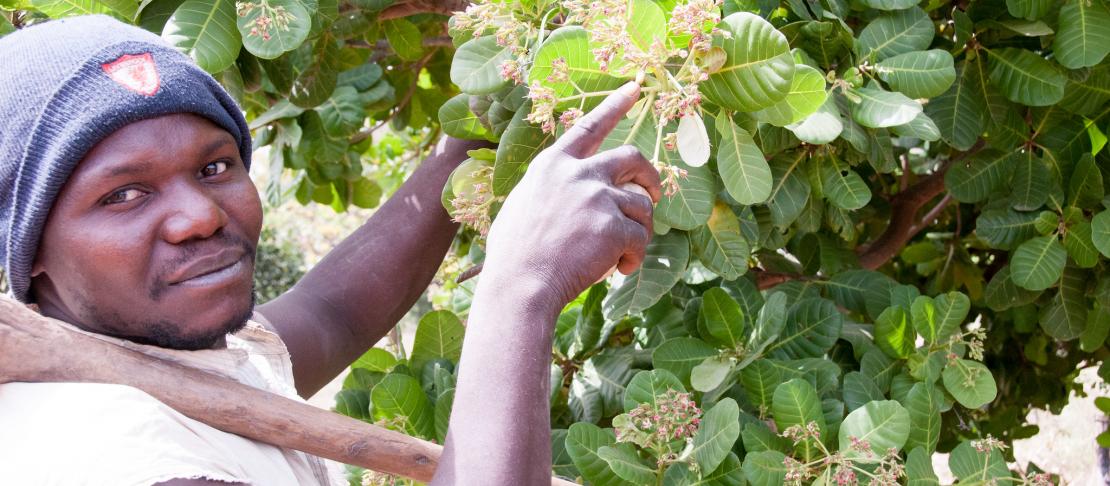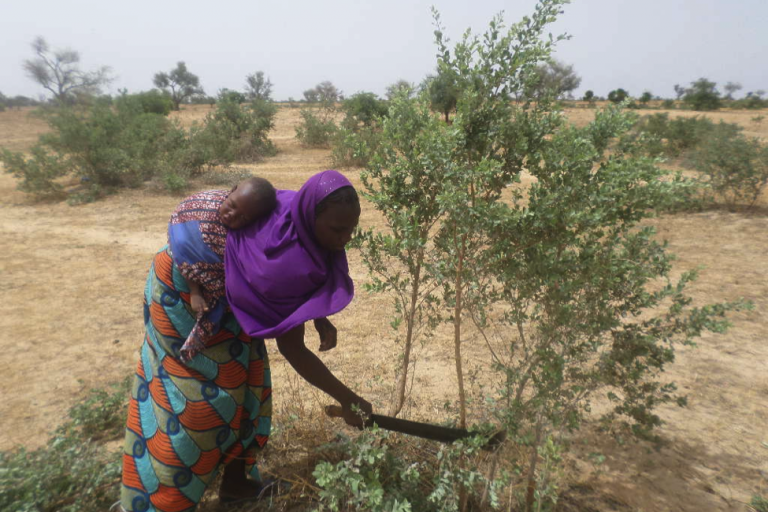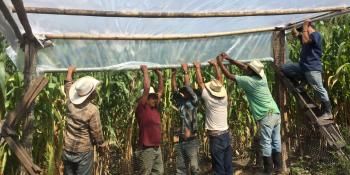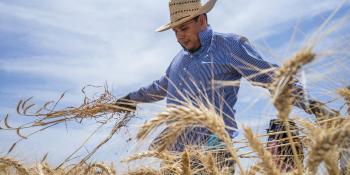Combatting desertification and drought through Climate-Smart Villages in the Sahel

The UN Convention to Combat Desertification's theme for this year's Desertification and Drought Day is 'Restoration. Land. Recover.' In line with that theme, the CGIAR Research Program on Climate Change, Agriculture and Food Security (CCAFS) works with the Climate-Smart Village (CSV) approach in the Sahel region. This aims to increase the capacity of smallholders to address land degradation and adapt to climate variation.
The Sahel region, which stretches between the Sahara and the Sudanian savanna and crosses multiple countries, is one of the driest and most vulnerable zones on the planet. Food, water and economic opportunities are often limited while, at the same time, local populations are growing rapidly. Climate hazards and land degradation are continuing at an alarming rate, sometimes forcing vulnerable communities to make disastrous choices. These challenges are threatening the livelihood of more than 80 percent of the Sahelian populations who make their living from subsistence rain-fed agriculture (Förch et al 2013).
CCAFS CONTRIBUTES TO fighting FOOD INSECURITY AND MALNUTRITION IN THE SAHEL
Several initiatives aiming to fight food insecurity and malnutrition in the Sahel have been implemented by a wide range of actors at several levels (local, national and even inter-governmental). Most of these initiatives have not succeeded due to the degradation of ecosystems, while food insecurity remains and has even increased in certain areas.
Faced with this nexus between desertification and food security, it is crucial not only to limit land degradation in the Sahel region but also to re-green the region. Since 2012, CCAFS and a strong network of partners, including the World Agroforestry Center (ICRAF), national agricultural research institutes and NGOs, have been working together in the region to tackle these interwoven challenges. The CSV approach plays a central role in this collaboration, building upon a global vision of promoting greater resilience, more sustainable agricultural and food production. Currently three CSVs in the region, Tiptenga (Burkina Faso), Kampa Zarma (Niger) and Kaffrine (Senegal), are challenged by severely degraded lands resulting from geographical and climate realities.
LAND AND VEGETATION RESTORATION: Tiptenga (Burkina Faso), Kampa Zarma (Niger) and Kaffrine (Senegal)
In these regions farming often takes place in extremely degraded and vulnerable environments where there is a considerable loss of vegetation and declining soil fertility, which affects food production. In these CSVs, various forms of climate information services, agro-sylvo-pastoral product diversification, mitigation and carbon sequestration, community management of resources, and capacity development are combined to restore these areas. A study led by ICRAF explores lessons learned based on the implementation of the three CSVs (plus a CSV located in Ghana, so not in the Sahel region). This study explains how the CSV approach presents some of the main routes by which agricultural research for development (AR4D) can contribute to land restoration.
The CSV approach seeks to sustain the diverse ecosystem services provided by agricultural landscapes in response to present climate variability and future climate change. In the three above-mentioned CSVs, for example, various technologies and practices have been tested. This includes vegetation cover restoration and species diversification through assisted natural tree regeneration also known as Farmers-Managed Natural Regeneration (FMNR) in protected areas.

A farmer removes side stems from a Guiera senegalensis, the first step in encouraging the strong central stem to take advantage of the root system. Photo: P. Savadogo (ICRAF)
In applying the CSV approach in Senegal, an innovation platform has been established, comprised of groups for market gardening, agroforestry, farmer-managed natural regeneration, tree nurseries, and protecting inter-village silvopastoral areas. The platform serves as a driving and motivating force, reaching around 200 farmers in the area.
In Niger and Burkina Faso, research has revealed the important adoption potential of FMNR and the zaï technology because they are simple and affordable. In addition, they provide immediate and diversified benefits both for the farmers and land restoration. For example, it has been concluded that FMNR improves soil fertility and protects young crop plants from strong winds. In addition, it provides fodder and wood for construction and energy. The zaï technique helps to conserve water, improve the efficiency of fertilizer due to its strategic placement in the sowing pit. This has a positive impact on tree and pasture regeneration. Even greater benefits have been obtained when these two techniques (zaï and FMNR) are combined as tested in Burkina Faso and Niger.
Other strategies, like tree planting within homestead compounds and on-farm fruit trees (e.g., mango and cashew in Ghana and tamarind, baobab and jujube/ber in Mali and Senegal) have attracted strong community commitment that can lead to the sustainability of these activities. For example, baobab trees in Kaffrine used to be overexploited for animal and human food, which resulted in a lack of regeneration. To address this, each baobab tree in the village was marked and its use was restricted. This has led to producers using other plant resources for livestock feed, including crop residues and cereal by-products, yielding convincing results. As a result, communities and especially women, now have an ample supply of baobab fruit from which they can generate income.
These techniques and practices are promising tools to fight desertification and drought, while and restoring and recovering land in the Sahel region. However, it is crucial that these are continually scaled up to ensure that we go beyond pilot projects and enact meaningful sustainable change (i.e,. in knowledge, attitudes and skills). This will bring higher quality solutions to millions of farmers and food system actors in a fast, equitable, inclusive and lasting manner across the Sahel and beyond.



